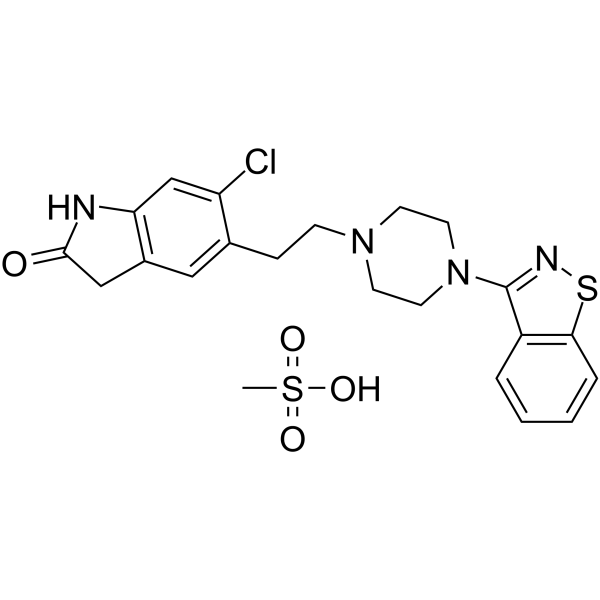Ziprasidone mesylate
Modify Date: 2025-09-11 11:40:47

Ziprasidone mesylate structure
|
Common Name | Ziprasidone mesylate | ||
|---|---|---|---|---|
| CAS Number | 185021-64-1 | Molecular Weight | 509.04 | |
| Density | N/A | Boiling Point | N/A | |
| Molecular Formula | C22H25ClN4O4S2 | Melting Point | N/A | |
| MSDS | N/A | Flash Point | N/A | |
Use of Ziprasidone mesylateZiprasidone (CP-88059) mesylate is an orally active combined 5-HT and dopamine receptor antagonist[1]. Ziprasidone mesylate has affinities for Rat D2 (Ki=4.8 nM), 5-HT2A (Ki=0.42 nM) and 5-HT1A (Ki=3.4 nM)[1]. |
| Name | Ziprasidone mesylate |
|---|
| Description | Ziprasidone (CP-88059) mesylate is an orally active combined 5-HT and dopamine receptor antagonist[1]. Ziprasidone mesylate has affinities for Rat D2 (Ki=4.8 nM), 5-HT2A (Ki=0.42 nM) and 5-HT1A (Ki=3.4 nM)[1]. |
|---|---|
| Related Catalog | |
| Target |
Rat 5-HT2 Receptor:0.42 nM (Ki) Rat 5-HT1A Receptor:3.4 nM (Ki) Rat D2 Receptor:4.8 nM (Ki) |
| In Vitro | Ziprasidone mesylate (0-500 nM, 150 seconds) blocks wild-type hERG current[2]. Cell Viability Assay[2] Cell Line: HEK-293 cells Concentration: 0-500 nM Incubation Time: 150 seconds Result: Blocked wild-type hERG current in a voltage- and concentration-dependent manner (IC50 = 120 nm). |
| In Vivo | Ziprasidone mesylate (oral gavage; 20 mg/kg; once daily; 7 weeks) results in weight loss, low level physical activity, high resting energy expenditure and greater capacity for thermogenesis when subjected to cold[3]. Animal Model: Eight-week-old female Sprague-Dawley rats weighing 200 to 250 g[3] Dosage: 20 mg/kg Administration: Oral gavage; 20 mg/kg; once daily; 7 weeks Result: Gained significantly less weight (P = 0.031), had a lower level of physical activity (P = 0.016), showed a higher resting energy expenditure (P < 0.001), and displayed a greater capacity for thermogenesis when subjected to cold (P < 0.001). |
| References |
| Molecular Formula | C22H25ClN4O4S2 |
|---|---|
| Molecular Weight | 509.04 |
| InChIKey | LOQSYPGSAZUDJZ-UHFFFAOYSA-N |
| SMILES | CS(=O)(=O)O.O=C1Cc2cc(CCN3CCN(c4nsc5ccccc45)CC3)c(Cl)cc2N1 |